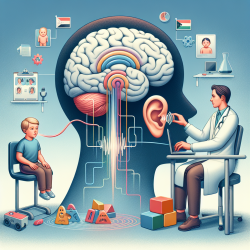Introduction: Navigating the New Terrain of Online Therapy
In the ever-evolving landscape of healthcare services, government health regulators may sometimes feel lost in determining the efficacy and regulation of new modalities such as online therapy. However, evidence-based data provides a beacon of clarity, particularly in the realm of speech and language pathology for children. As a seasoned professional in this field, I aim to elucidate how online therapy can be a powerful tool in creating positive outcomes for kids.
Data-Driven Insights: The Foundation of Online Therapy
Online therapy has gained traction over recent years, largely due to its accessibility and adaptability. Research has consistently demonstrated that online therapy is not only effective but also provides unique advantages over traditional in-person sessions. A study published in the "Journal of Telemedicine and Telecare" revealed that children receiving online speech therapy made similar progress in language skills as those attending face-to-face sessions.
For regulators, this data underscores the viability of online therapy as a legitimate and effective option for children requiring speech and language interventions. The ability to track and analyze data from online sessions further enables practitioners to refine treatment plans and ensure that interventions are both personalized and effective.
Benefits of Online Therapy for Children
Online therapy offers several advantages that can significantly enhance the therapeutic experience for children:
- Accessibility: Children in remote or underserved areas can access high-quality therapy without the need for travel.
- Flexibility: Sessions can be scheduled at convenient times, reducing the stress and logistical challenges often associated with traditional therapy.
- Engagement: Interactive digital tools can make sessions more engaging and enjoyable for children, potentially improving outcomes.
These benefits align with the goals of government health regulators to provide equitable and effective healthcare services to all children, regardless of geographic or socioeconomic barriers.
Regulatory Considerations: Ensuring Quality and Compliance
For online therapy to be successfully integrated into healthcare systems, it is crucial that government health regulators establish clear guidelines and standards. These should focus on:
- Licensing and Credentialing: Ensuring that online therapists meet the same professional standards as their in-person counterparts.
- Data Privacy: Implementing robust measures to protect the privacy and confidentiality of children's data.
- Outcome Measurement: Developing metrics to assess the effectiveness of online therapy interventions.
By addressing these considerations, regulators can facilitate the safe and effective implementation of online therapy, ensuring that it remains a reliable option for children's speech and language development.
Conclusion: A Path Forward
In conclusion, the data-driven success of online therapy in improving outcomes for children is undeniable. As government health regulators, the opportunity to shape the future of healthcare delivery is within reach. By embracing online therapy and establishing comprehensive regulatory frameworks, we can ensure that every child has access to the resources they need to thrive.










